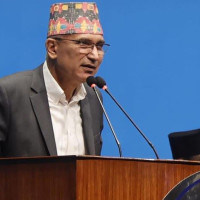- Monday, 20 May 2024
Valmiki's Vision Alongside Machiavellian Rulers
Maharshi Valmiki belonged to the old mythical days. His parents called him Ratnakar (a beam of precious jewels), but he plundered wayfarers for his family. Once, he met Narad, a legendary Rishi who had access to both the gods in heaven and the beings on earth. The Rishi was a flash of inspiration. Afterwards, Ratnakar took to penance, maintaining a single posture for years in devotion to God. Years passed before he finally attained divine power. But due to his prolonged posture in devotion, white ants, known as Valmik in Sanskrit, were attracted to him. They formed a mound over his body. The mound had to be broken, and as he broke it, he became popular by the name of Valmiki. He was thus a Maharshi, a great Rishi, and composed the holy epic of Ramayan as an Adikavi (first poet). This book represents 'Ramrajya' under King Ram, who was always ready to make sacrifices for good governance and the welfare of his people. Countries in the Aryavarta regions, including Nepal, Hindustan, Sri Lanka, and even distant Muslim countries like Indonesia, regard this book as holy. It ends with a message: King Ram’s subjects were happy and healthy; they pursued Vaidic dharma; women lived long lives alongside their men; and families were united.
Accordingly, Ramrajya signifies wellness and well-being for the subjects within the kingdom. King Ram favoured his subjects even at the cost of the throne. As an ideal king, he put them first and himself second. Ramayan shows why a ruler’s pleasures are less important than the welfare of the people. Two examples from the exile period highlight Ram's ideals. One is Shabari, a devoted woman who tasted each wild plum before Ram ate heartily. The other is Nishad, a lower-caste devotee whom the upper-caste king treated as an equal subject. Ram even left his beloved wife, Sita, in the forest. She suffered because the subjects doubted her chastity during her time as Ravan’s hostage. Another epic, the Mahabharat by Maharshi Ved Vyas, is also relevant here. In it, the cousins Kaurav and Pandav battle for the throne, ultimately killing each other. This incident shows what family cousins should not do, as bitterness between them has damaged and destroyed both sides. In contrast, Ramayan teaches the ideals of what one should do.
Machiavelli in living history
Machiavelli is relatively recent. Unlike Valmiki, he hails from 15th-century Italy and is known as a non-mythical leader who advocated for absolute rule and power. His full name is Niccolò Machiavelli (AD 1469–1527). One of his most renowned works is "The Prince" (in Italian, "Il Principe," 1513). This work serves as a political treatise exploring power, rule, leadership, and the tactics rulers use to control people. Machiavelli values a political actor who dismisses sentiment because governance has no room for self-pity or compassion. His philosophy and approach stand in stark contrast to Valmiki's. For Valmiki, the means come first in the system of rule, which favours ethics. In contrast, for Machiavelli, the end comes first in the system of rule, which favours no ethics. Machiavelli’s approach is thus goal-oriented, even if it involves violence and crime. This illustrates the ruthless legacy of today's power-seeking rulers, who victimise their people.
Besides these two examples, recent world history is well aware of Hitler’s power lust leading to genocide and the extermination of a race. Such a record of world dictators is profuse with bloodshed, seizing power through unfair and unethical means. This highlights the contrast in political ideologies and rules when compared to Hitler's regime. The two figures, Valmiki and Machiavelli, are central to the discussion of power and systems of rule here. They aptly illustrate their foresight and ideals when understanding a nation, its people, and democratic governance in the right way.
The overall purpose of this column is to underscore the importance of rules and the general welfare of the people. Machiavelli's approach is controversial, especially in a democratic regime, standing apart from mainstream ideals. His tactics encompass crime, murder, bloodshed, corruption, and manipulation of electoral processes—all unethical yet goal-oriented—defining his intentions. Such strategies often prioritise power over welfare. Unfortunately, many modern systems of rule seem to embrace these unethical ideals. In contrast, Herman Hesse, in his book Siddhartha, portrays Emperor Ashoka (known as Ashoka the Great) as a shrewd ruler. After the bloodbath of the Kalinga War, Ashoka advocated for nonviolence and embraced Buddhism. This change puzzled his subjects, as he also urged them to follow the Buddha. Consequently, once-hostile hands now extend into begging bowls. Consider these hands: could they now rise against a king? The war had terror and violence, and thousands of families missed their kin. History records that Ashoka's reign was one of peace and harmony.
Trail of politics
In the Ramayan, the king is referred to as Maryada Purushottam Ram. It asserts that the welfare of the people comes first, even when the ruler faces personal hardships. While not a ruler himself, Valmiki behaved as a visionary statesman to say first about the virtues and morals of the ruler. In contrast, while in power, Machiavelli saw his ends over the means. The ideal vision of a ruler has remained a subject of debate since the days of Aristotle and Lincoln. Lincoln stated, “Democracy is of the people, by the people, and for the people.” Here, both means and end see a rule of general welfare, whereas the Machiavellian approach sees the means only for the end at the cost of general welfare.
With time, political contexts and processes evolve as well. Today’s world may not be suitable for the approaches of both Ramrajya and Machiavelli. Leaders and rulers then have to understand that power is not an end; it’s just a beginning; they must also govern with vision. They could look to figures like Duryodhan from the Mahabharat. Duryodhan’s negative image is clear to the readers, but he had a positive image too.
He was admired for his charity and favoured by the goddess Laxmi. She recognised his divine power because, whatever his amount of charity, it would return to the Treasury twofold. Today's leaders neither pursue Valmiki's ideals nor ar e they blind to Machiavellian values, nor could they become like Hitler in committing genocide. Unfortunately, the government has fueled feelings of irritation, hate, and pessimism.
(The author is a retired lecturer of English.)





-square-thumb.jpg)










